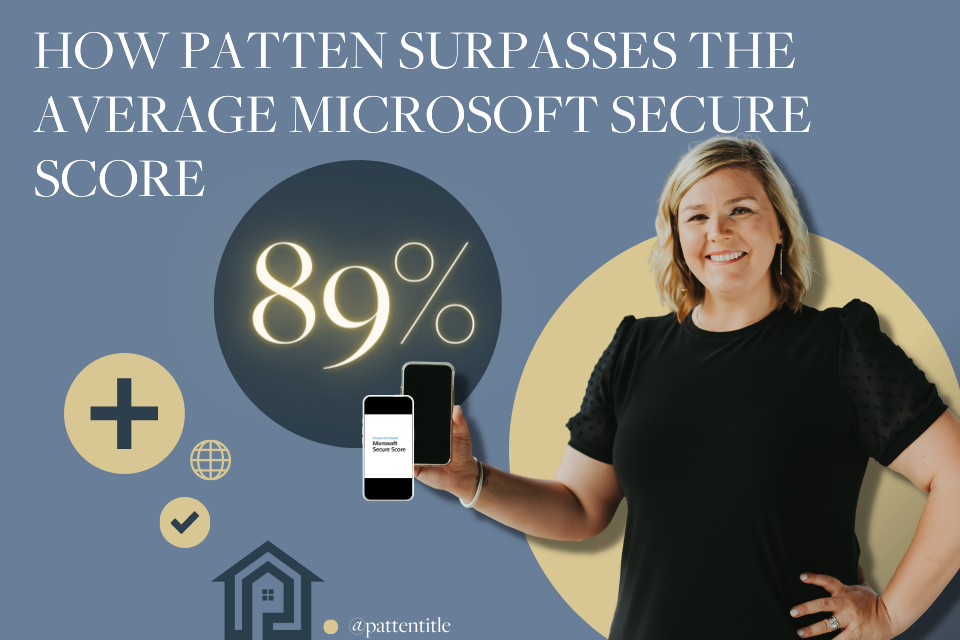When you’re buying a home, the last thing you want to worry about is fraud and cybercrime. You don’t want to be concerned that bad actors might steal your personal information during a money transfer, or risk your new title being compromised.
With the federal government warning that cybercrime is on the rise, it is important to understand how the companies you work with handle their own cybersecurity.
Patten Title has achieved a consistent Microsoft Secure Score of 89%. What does that mean? Consider that most companies average a score of 50%, and we can explain why the Patten Promise includes an emphasis on security for all Patten clients and customers.
What is the Microsoft Secure Score?
Any company using the Microsoft Office 365 environment can see its Secure Score, indicating the security of apps, desktops, and other devices used within the company. Since about 85% of enterprises around the world use Microsoft Office 365, most companies can assess their calculated score and compare their cybersecurity measures against those of other organizations worldwide.
The Secure Score calculates the security permissions given by a company as compared to how many it could allow. This means that the security of every user in the enterprise is taken into account, from the person sitting at the front desk, to business development representatives, to the CEO and president of the company.
Most organizations about the same size as Patten Title earn an average score of 44.75%. It is a challenge for businesses to reach and maintain a score in the high 80s or low 90s because of the constant monitoring and proper licensing required.
Many don’t reach above 95% due to requiring an intense “lockdown” of every employee within the company.
How Does Patten Title Keep Your Identity Secure?
Patten Title takes its Secure Score seriously. Because the score can be accessed at any time, most organizations monitor and work to improve their own rating. While some enterprises revisit their Secure Score monthly or quarterly, Patten Title does it every day.
Patten Title has chosen to partner with a third party that keeps a close eye on its Secure Score 24/7. The team of dedicated security specialists can immediately respond to threats and attacks. This also allows for constant updates and locking down new threats as they develop.
Organizations that choose to monitor their own Secure Score may find their score fluctuates because of the rhythm of addressing issues. For example, some enterprises check their score quarterly and find that there has been a drop, so they address those holes immediately. Their score improves immediately, but it may drop over time until the next check.
By knowing vulnerabilities immediately, Patten Title is able to plug holes and find gaps in its cybersecurity, before fraudsters expose them.
What Tools Protect Patten Clients?
Patten Title has invested in tools designed to protect clients and customers as they make their real estate title transactions.
CertifID is one software solution that integrates into other technologies used during the average real estate transaction. This platform protects against wire fraud and recovers any lost funds due to fraud. Patten Title is one of the few title agencies to take on such a preventative step, ensuring client transactions are both safe and secure.
In 2022, Patten Title joined the cause in protecting more than $1.5 trillion against wire fraud, according to CertifID reports. In addition, nearly 2,000 sellers were protected and as a result, more than 218 hours of time were saved by eliminating the threat of fraud.
Other apps used by Patten escrow agents, like ZOCCAM, are designed for secure funds transfers. ZOCCAM is an app that allows buyers to transfer earnest money deposits while protecting confidential user data from potential fraud.
Pairing trusted applications and security solutions like CertifID and ZOCCAM, with close monitoring of the MicrosoftSecure Score, Patten Title is dedicated to protecting all sides of a transaction, from buyers and sellers, to real estate agents and escrow officers.



